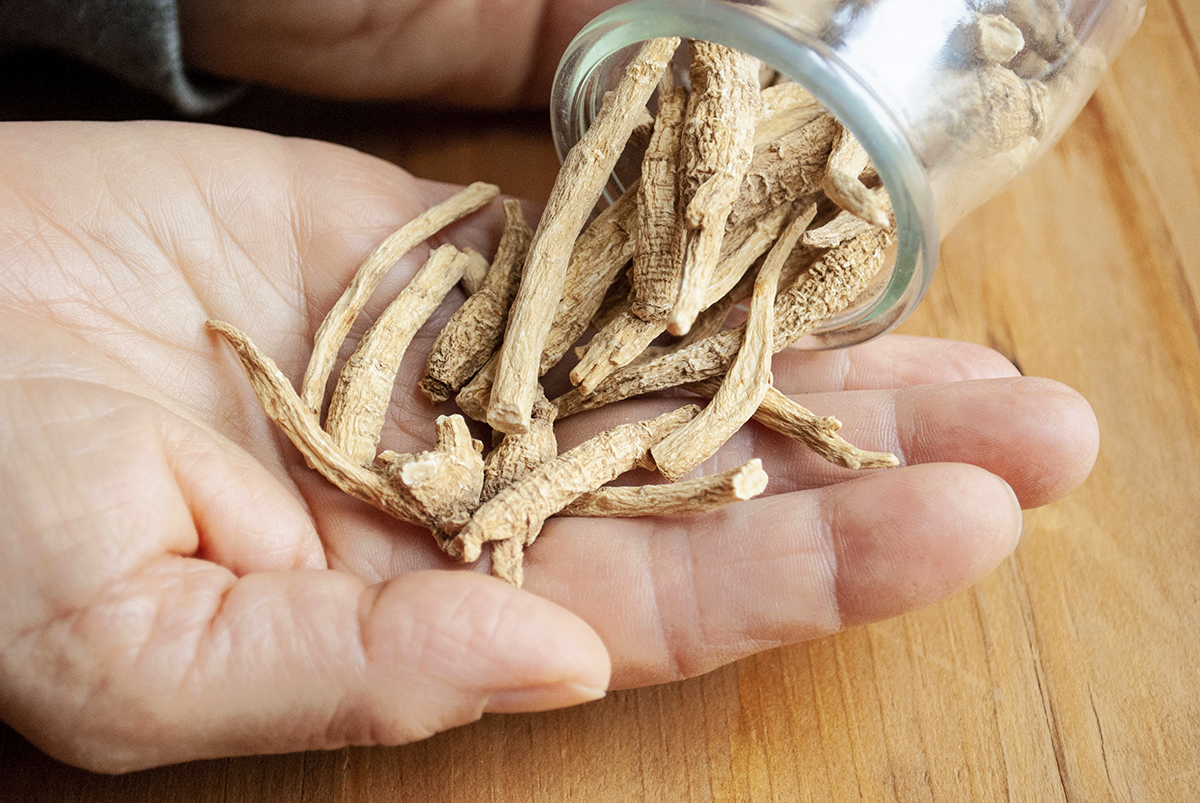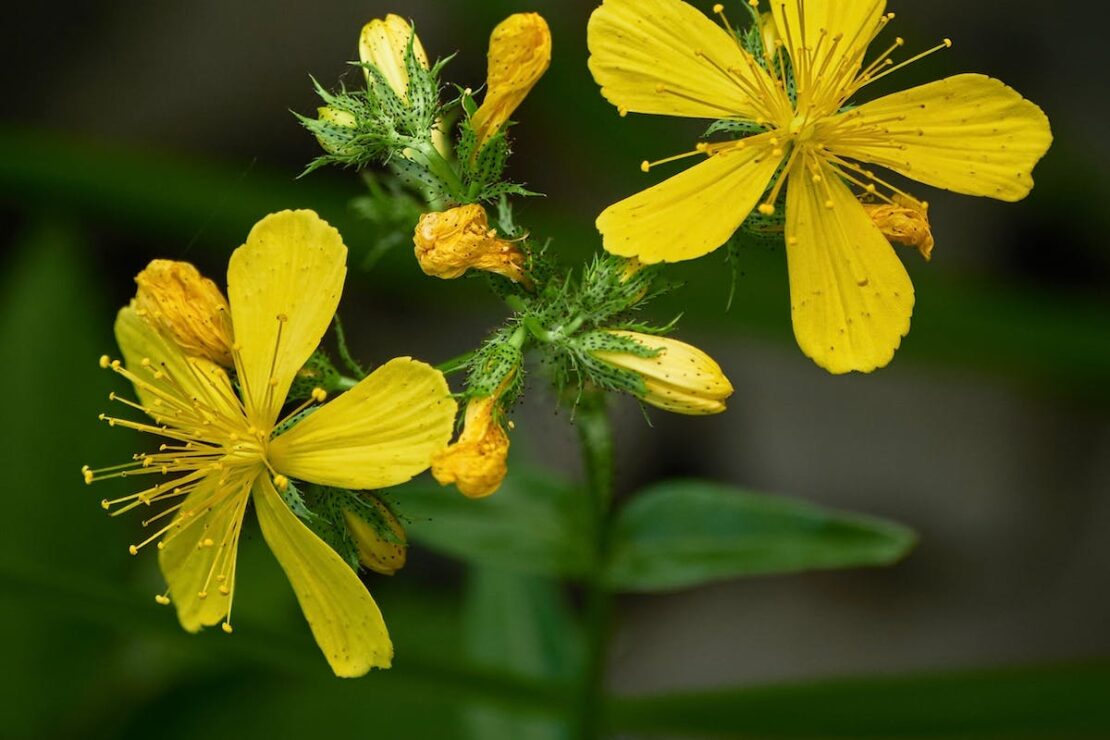
5 Herbs for Mental Health Support
It’s that time of year again. The seasons are shifting, and while we savor the beauty of changing seasons, some also mourn the end of warm weather as the clouds roll in and the cooler weather settles. Many people struggle with mental health issues, and oftentimes these feelings can seem amplified in the wintertime. Note: Depression is a serious medical condition. Please seek treatment from a qualified professional.
If you often feel like your mental health is on a roller coaster ride, you are not alone. According to the 2023 Census Bureau’s Household Pulse Survey, 50% of young adults ages 18-24 and 32% of all adults in America reported experiencing symptoms of anxiety or depression recently (“Latest Federal Data…”, n.d.).
Mental health struggles can look and feel different depending on the individual. You might feel sad, withdrawn, anxious, irritated, or hopeless. Symptoms may manifest as insomnia, fatigue, or trouble concentrating. Your mental health can fluctuate on a day-to-day basis, depending on stress, anxiety, physical health, socioeconomic factors, loneliness, and so much more. Mental health issues can really weigh you down, negatively impacting how you think, feel, and move about in the world.

Mental Health and SAD
There are many types of diagnosable mental health conditions, with anxiety disorders being the most common. These can include generalized anxiety disorder, panic disorder, social anxiety disorder, post-traumatic stress disorder (PTSD), and others. There are also a variety of mood disorders, including depression, bipolar disorder, seasonal affective disorder (SAD), and more (“Mental Disorders,” 2022).
Many people living far from the equator struggle with seasonal depression, also commonly referred to as seasonal affective disorder, or SAD for short. SAD typically begins during autumn and carries on throughout winter, and is common for individuals living in parts of the world that experience little sunlight and harsh winters that keep them indoors the majority of the time.
According to the World Health Organization: “Mental health is more than the absence of mental disorders” (“Mental Health,” 2022, para. 2). Optimal mental health is not just about managing current issues, but also actively nurturing a balanced state of mental health.
Luckily, there are steps you can take to help you navigate the shadows of mental health struggles and support your body naturally. Regardless of a mental health diagnosis, almost anyone can benefit from incorporating supportive and nutritive herbs into their daily routine. Of course, it is important to consult your healthcare practitioner when addressing serious mental health disorders and determine the best approach for support. It is also important to consider lifestyle choices that support mental wellness, some of which are discussed further below.
With winter right around the corner, autumn is a great time to stock up on herbs and formulations that nourish your mental health. In this blog article, you’ll learn about some of the top traditional herbs that are commonly used for mental health support and ways that you can incorporate them into your daily life.
5 Herbs for Mental Health Support
The following botanicals listed below are just a few of the many traditional herbs that are commonly used to support mental health worldwide. Keep in mind that every person and situation is different, and the interactions between each individual and a certain herb can be unique. This information is solely meant to be an educational guide to help you find which plants work best for you.
Ashwagandha root (Withania somnifera)
Ashwagandha is an adaptogen, a substance that supports the body in adapting and responding to stress (Panossian & Wikman, 2010). The root of the ashwagandha plant is commonly used in Ayurveda, where it is believed to be a rejuvenating tonic that helps restore and rebuild energy in the body (Gladstar, 2017).
Herbalists often consider adaptogens to be tonic herbs that can generally support the body and balance physical, mental, and emotional health. Tonics are believed to help strengthen the body, restore healthy function, and support whole-body wellness; they are generally taken regularly for specific periods of time. Some tonic herbs nurture overall health, while others are more focused on a specific bodily system (“Ask an Herbalist,” 2020).
Ashwagandha root is both energizing and soothing, supporting the brain and body to react to stress in a more balanced and sustainable way. This herb has been historically used for nervous tension, stress, anxiety, low energy levels, fatigue, and insomnia due to stress (Gladstar, 2017).
This nourishing root is commonly used as an herbal tea, tincture, supplement, or powder. As a tonic herb, it’s common to take this herb on a daily basis for overall stress and anxiety relief, however, the dosage will vary depending on the individual. Ashwagandha is generally safe to take in fairly high amounts and the recommended consumption is somewhere between 3 to 9 grams per day. See The Beginners Guide to Ashwagandha for more information.
A popular way to incorporate ashwagandha root into your diet is by sprinkling the root powder in hot water steeped with common chai spice herbs like cinnamon, ginger, cardamom, clove, and fennel seeds. You can also add your favorite sweetener and milk of choice, and enjoy!
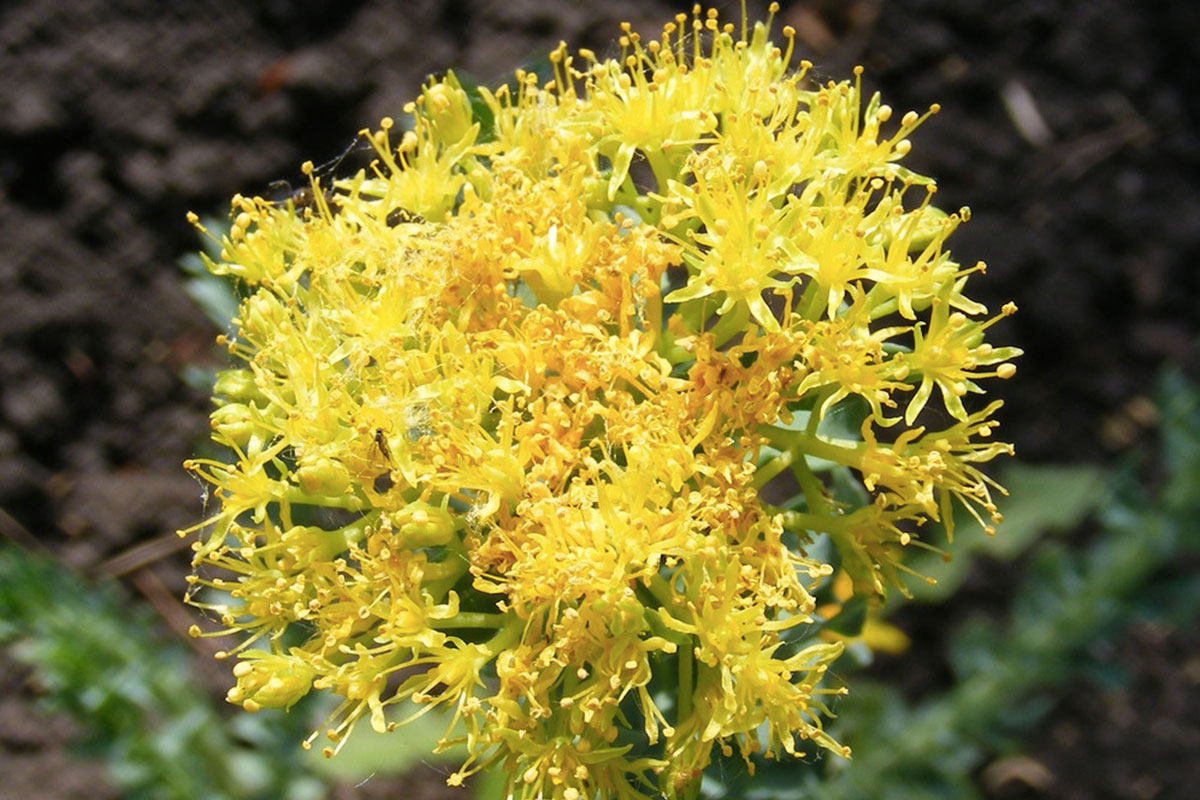
Rhodiola (Rhodiola rosea)
For centuries, rhodiola has been and continues to be utilized by Indigenous people and in many traditional systems of medicine, including (but not limited to) Chinese medicine, Tibetan, Russian, Central Asian, and Scandinavian traditions (Winston, n.d.). Rhodiola is considered an adaptogen and tonic herb, like ashwagandha, with an affinity for strengthening and supporting physical and mental health.
Based on clinical research, some experts believe rhodiola helps reduce signs of stress and mild to moderate depression, on top of providing neuroprotective qualities and mental health support. Research also suggests that rhodiola may help address anxiety, chronic fatigue syndrome, fibromyalgia syndrome, and attention deficit hyperactivity disorder (ADHD) (“Complementary & Alternative Medicine for Mental Health,” 2016). In one study, 100 participants took 400 mg of rhodiola each day for 8 weeks and noticed improvement in their stress symptoms, fatigue, quality of life, mood, and concentration after the first week of use (Lekomtseva, Y., Zhukova, I., & Wacker, A., 2017).
Rhodiola can be taken as a tea or tincture, but it is most commonly consumed as a powdered supplement in capsule form for accurate dosing. It’s generally recommended to take rhodiola on an empty stomach but not before bedtime because it can be slightly stimulating. Doses range from 100-600 mg per day depending on the intended use (Lamoreux, K. & Van De Walle, G., 2023).
Cautions
There is a potential risk of drug interactions for those using antianxiety, antibiotic, or antidepressant medications, birth control pills, or diabetic and thyroid drugs, so be sure to check with your physician before consuming rhodiola with any of these types of medications (“Complementary & Alternative Medicine for Mental Health,” 2016).
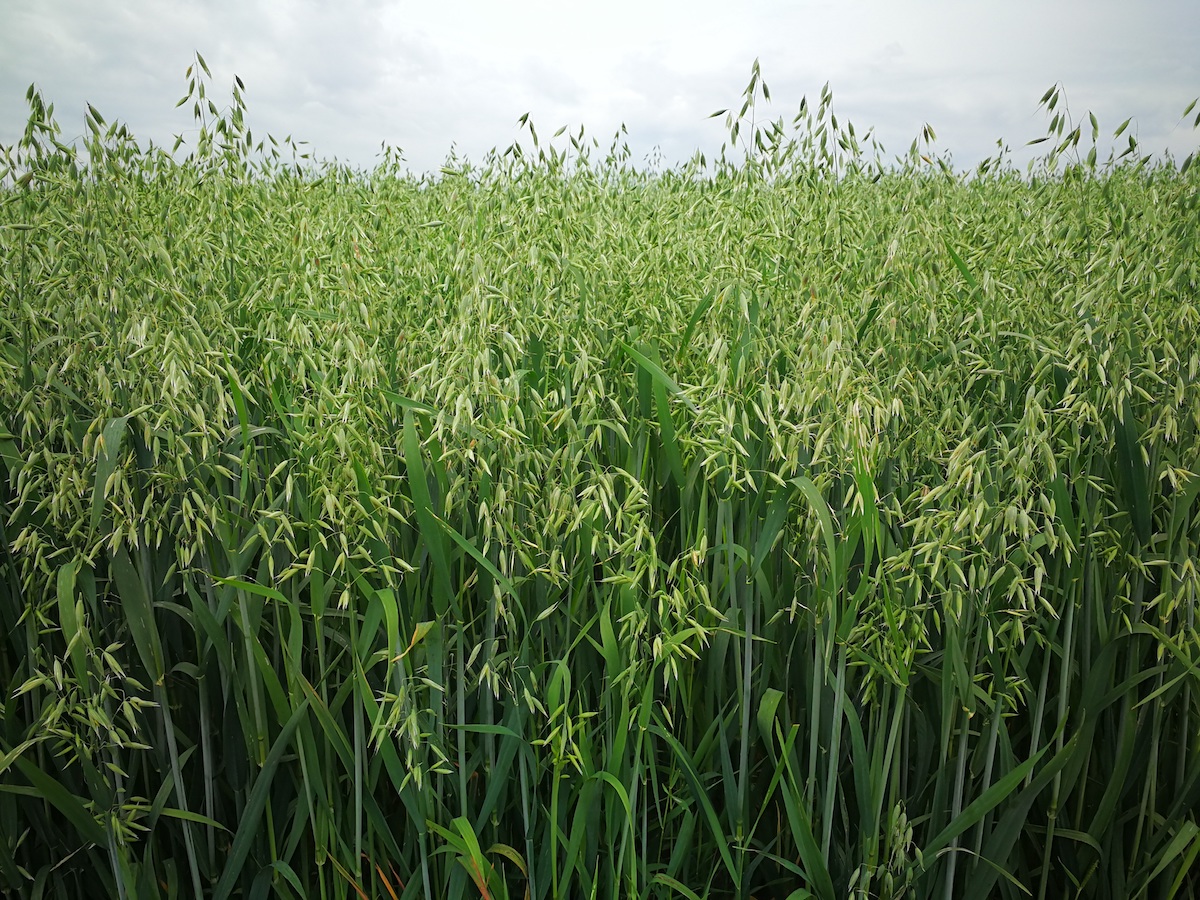
Milky Oats (Avena sativa)
Milky oats come from the same oat plant that is the source of your morning bowl of oatmeal. Milky oats are the unripe seed pods of the plant that are harvested when they release a “milky” sap when pinched, a short window that only occurs for a couple of weeks out of the year.
In Western herbalism, milky oats are also considered a tonic herb, like ashwagandha, but with a special affinity for the nervous system. The milky oat tops are highly nutritive and nourishing to the nervous system, rich in silica, calcium, chromium, magnesium, vitamin E, and polyunsaturated fatty acids. Herbalist Rosemary Gladstar shares that “as a nutritive tonic, they build overall health, vitality, energy, and stamina, while at the same time soothing and healing the system” (Gladstar, 2017, page 157).
Milky oats are commonly used in instances of nervous system disorders, depression, irritability, and anxiety (Gladstar, 2017). In fact, one study found that after regularly taking milky oats extract for four weeks, participants not only experienced lower stress levels but also increased cognitive function (Kennedy et al., 2020).
For best results, herbalists reach for the fresh milky oats tincture versus the dried herb, since the fresh milky juice holds most of the plant’s nutritive qualities. However, if you can’t find the fresh tincture, the dried oat tops also make a lovely herbal tea.
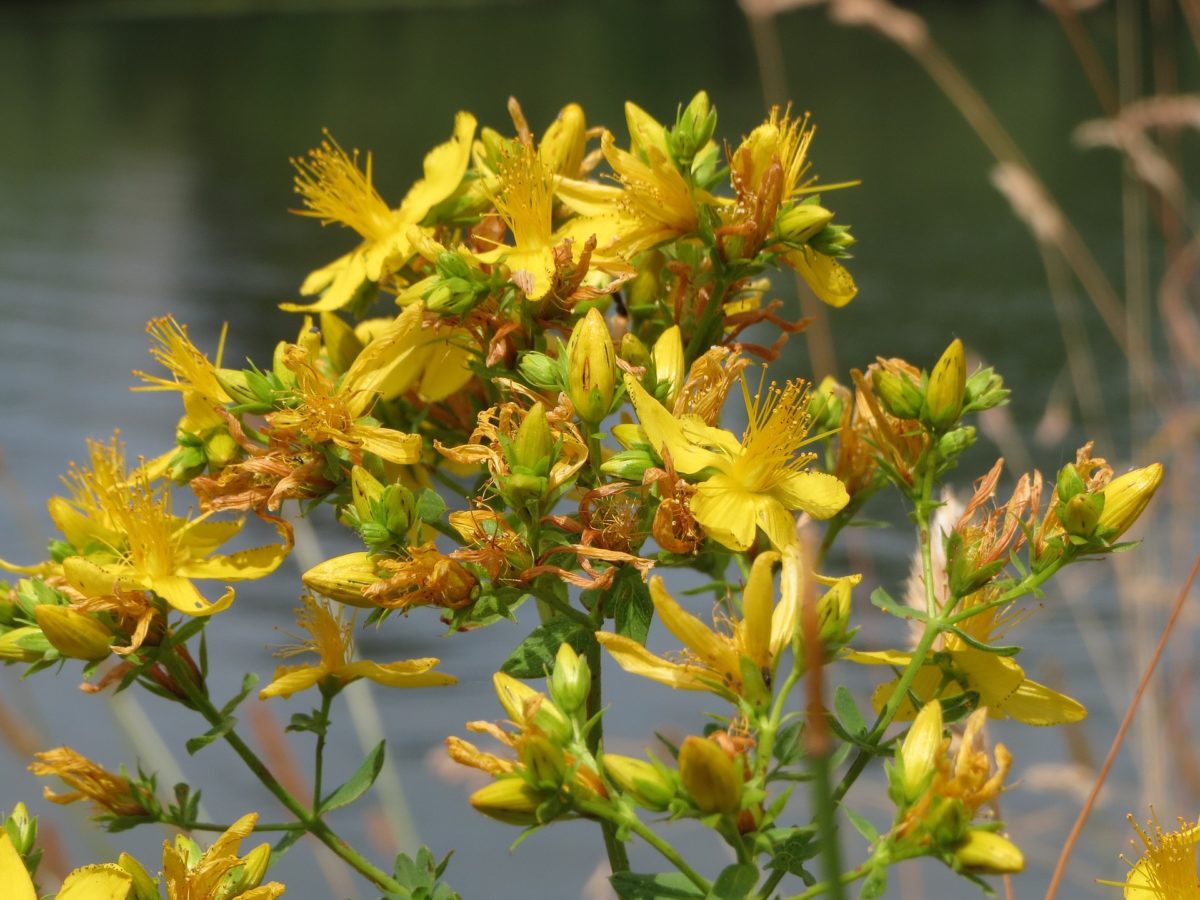
St. John’s Wort (Hypericum perforatum)
St. John’s wort is a well-known herb commonly used to address depression. Just one glance at this vibrant yellow little flower brings to mind its resemblance to a bright, shining sun. When your emotions feel dark and gloomy, St. John’s wort can help call in more warm, sunny feelings into your life, helping to uplift your mood and brighten your spirit.
According to herbalist Scott Kloos, St. John’s wort “brings light to dark situations, relieves seasonal affect disorder, and resolves depression especially as it relates to frustration” (Kloos, 2017, page 287). There are numerous studies on the use of St. John’s wort for depression, and one meta-analysis found after reviewing 27 clinical trials with almost 4000 total participants that the use of St. John’s wort has comparable effectiveness when compared to SSRIs when used for mild-to-moderate depression (Ng, Q.X., Venkatanarayanan, N., & Ho, C.Y., 2017).
This herb is traditionally used as both a tea and tincture, though capsules are commonly available in commerce as well. The dose often used varies among each individual and their specific situation and needs. Fresh flower tinctures can be taken in doses of 40 to 60 drops 3 to 4 times per day. Dried herb tea can be made by steeping 2 to 3 teaspoons of herb per cup of water in a covered vessel for 30 minutes. Strain and drink up to 2 cups of this throughout the day (Winston, 2007).
Cautions
Research suggests that St. John’s wort may alter how the liver processes certain medications, so if you are taking any prescription medications, check with your doctor before consuming St. John’s wort. Large doses may cause photosensitivity in some individuals (Kloos, 2017).
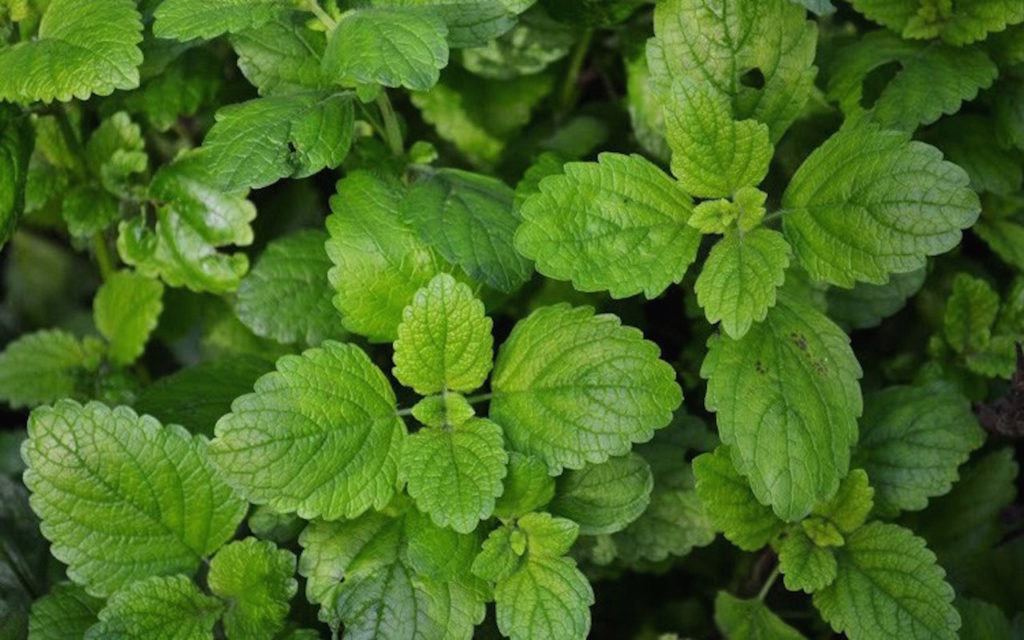
Lemon Balm (Melissa officinalis)
This sweet, citrus-smelling plant is highly nourishing to the nervous system, gently soothing stress, nervous anxiety, and tension in the mind and body. Lemon balm is thought to help uplift the mood, dissipate depression, and “cool an agitated heart” (Kloos, 2017, page 210). As a member of the mint family, lemon balm can also soothe mild digestive discomfort, and has a special affinity for addressing digestive issues associated with stress, anxiety, or mental health struggles.
Lemon balm is believed to help calm a racing pulse and relax those who feel restless from anxiety. Both the tea and tincture are commonly used internally, and the essential oil can be used in aromatherapy to help soothe the nerves and calm the mind. You can make lemon balm tea by steeping one tablespoon of dried leaves per cup of water for at least 20 minutes.

Mental Health and Holistic Approaches
Mental health is a complex puzzle. Holistic health is a comprehensive and integrative approach to well-being that considers the interconnectedness of mind, body, and spirit. It encompasses a wide range of practices, including nutrition, mindfulness, alternative therapies, and complementary medicine, all of which aim to support the body’s innate ability to repair and find its optimum balance. By addressing the whole person, holistic systems seek to promote overall health, vitality, and a sense of inner harmony, fostering a state of wellness that goes beyond mere absence of disease.
It is important to note that the many natural approaches to supporting your mental health and herbs are just one part of the puzzle. For example, many folks struggling with SAD where decreased exposure to sunlight is a huge contributor to their symptoms might find that UV light therapy, checking vitamin D levels, and possibly supplementing with vitamin D may be helpful (“Seasonal Depression,” n.d.). In addition, many people find holistic approaches like therapy, exercise, journaling, meditation, nutrition, spending time in nature, connecting with loved ones and pets, acupuncture, and other self-care activities to be beneficial to their mental health.
Aromatherapy is an additional way to incorporate plants into your daily life for mental health support. Many aromatic plants can be soothing to the mind, body, and spirit, including lavender, chamomile, rose, geranium, bergamot, rosemary, jasmine, and more.
For instance, there have been considerable scientific studies on lavender essential oil that suggest it is very effective at calming the nervous system and helping reduce feelings of anxiety (Malcolm & Tallian, 2018). You can try adding a couple drops to an essential oil diffuser to be used as aromatherapy, or diluting 2-3 drops in a carrier oil to be used topically as an aromatherapeutic body oil or self-massage oil.
In Closing,
As we continuously work to tend to the garden of our mental health, one thing remains abundantly clear—we are not alone. Countless powerful plant allies are here to offer us support, ready to walk us through any challenges that come our way.
However, it’s essential to remember that herbs are not a panacea. They complement, rather than replace traditional medical treatments and holistic approaches. Before embarking on any herbal regimen, it’s crucial to consult with a healthcare professional to ensure they align with your unique needs and circumstances (and to check for any contraindications if you are taking pharmaceutical medications.
If you are struggling with mental health issues, do not try to diagnose yourself or create your own plan. Be sure to seek the help of a therapist and/or qualified health practitioner who can support you on your wellness journey, as well as explore if there are any underlying health issues that need to be addressed. If you or someone you know is thinking about suicide, you can call or text the Suicide Lifeline at 988.
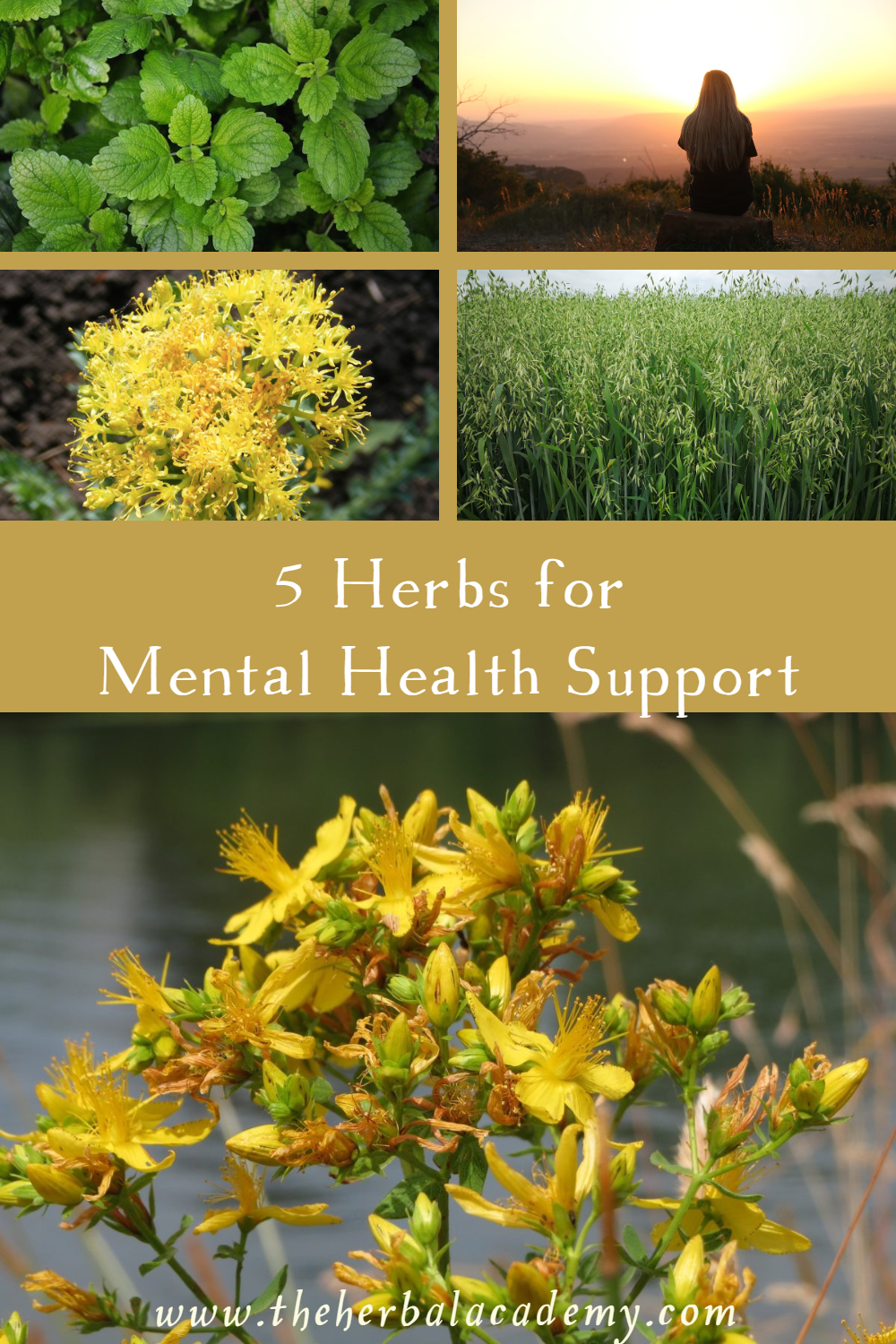
REFERENCES
Herbal Academy (2020). Ask an Herbalist: Herbal Tonics 101. Retrieved October 12, 2023, from https://theherbalacademy.com/herbal-tonics-101/
Complementary & Alternative Medicine for Mental Health. (2016). Mental Health America. Retrieved October 14, 2023, from https://www.mhanational.org/sites/default/files/MHA_CAM.pdf
Gladstar, R. (2017). Rosemary Gladstar’s herbal healing for men. Storey Publishing.
Kennedy, D.O., Bonnländer, B., Lang, S.C., Pischel, I., Forster, J., Khan, J., … & Wightman, E.L. (2020). Acute and chronic effects of green oat (Avena sativa) extract on cognitive function and mood during a laboratory stressor in healthy adults: A randomised, double-blind, placebo-controlled study in healthy humans. Nutrients, 12(6), 1598. https://doi.org/10.3390/nu12061598
Kloos, S. (2017). Pacific Northwest medicinal plants: Identify, harvest, and use 120 wild herbs for health and wellness. Timber Press.
Lamoreux, K. & Van De Walle, G. (2023). 7 Science-backed health benefits of rhodiola rosea. Healthline. Retrieved November 13, 2023 from https://www.healthline.com/nutrition/rhodiola-rosea#TOC_TITLE_HDR_9
Latest Federal Data Show That Young People Are More Likely Than Older Adults to Be Experiencing Symptoms of Anxiety or Depression. (n.d.) KFF. Retrieved October 14, 2023, from https://www.kff.org/mental-health/press-release/latest-federal-data-show-that-young-people-are-more-likely-than-older-adults-to-be-experiencing-symptoms-of-anxiety-or-depression/
Lekomtseva, Y., Zhukova, I., & Wacker, A. (2017). Rhodiola rosea in subjects with prolonged or chronic fatigue S=symptoms: Results of an open-label clinical trial. Complement Med Res. 24(1):46-52. https://doi.org/10.1159/000457918
Malcolm, B.J., & Tallian, K. (2017). Essential oil of lavender in anxiety disorders: Ready for prime time? Mental Health Clinician, 7(4), 147-155. https://doi.org/10.9740/mhc.2017.07.147
Mental Health. (2022). World Health Organization. Retrieved October 13, 2023, from https://www.who.int/data/gho/data/themes/theme-details/GHO/mental-health
Mental Disorders. (2022). World Health Organization. Retrieved October 31, 2023, from https://www.who.int/news-room/fact-sheets/detail/mental-disorders
Ng, Q.X., Venkatanarayanan, N., & Ho, C.Y. (2017). Clinical use of Hypericum perforatum (St. John’s wort) in depression: A meta-analysis. J Affect Disord. Mar 1;210:211-221. https://doi.org/10.1016/j.jad.2016.12.048
Panossian, A., & Wikman, G. (2010). Effects of adaptogens on the central nervous system and the molecular mechanisms associated with their stress-protective activity. Pharmaceuticals, 3(1), 188-224. https://doi.org/10.3390/ph3010188
Seasonal Depression (Seasonal Affective Disorder). (n.d.) Cleveland Clinic. Retrieved October 14, 2023, from https://my.clevelandclinic.org/health/diseases/9293-seasonal-depression
Winston, D. (2007). Adaptogens: Herbs for strength, stamina, and stress relief. Healing Arts Press.
Winston, D. (n.d.). Rhodiola rosea. American Botanical Council. Retrieved October 16, 2023, from https://www.herbalgram.org/resources/herbalgram/issues/107/table-of-contents/hg107-bkrvw-rhodiola/

